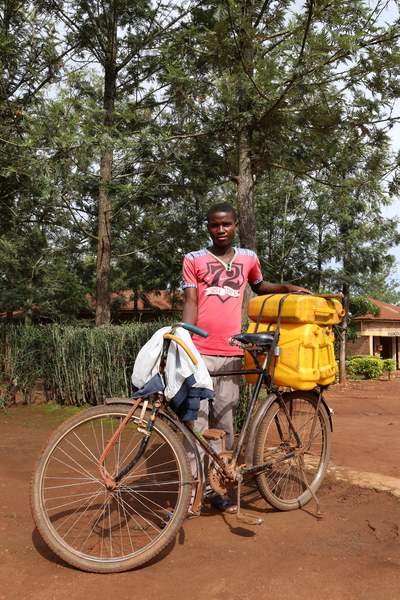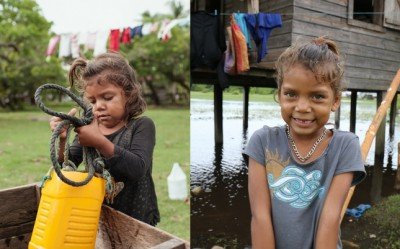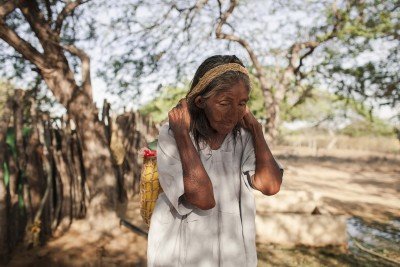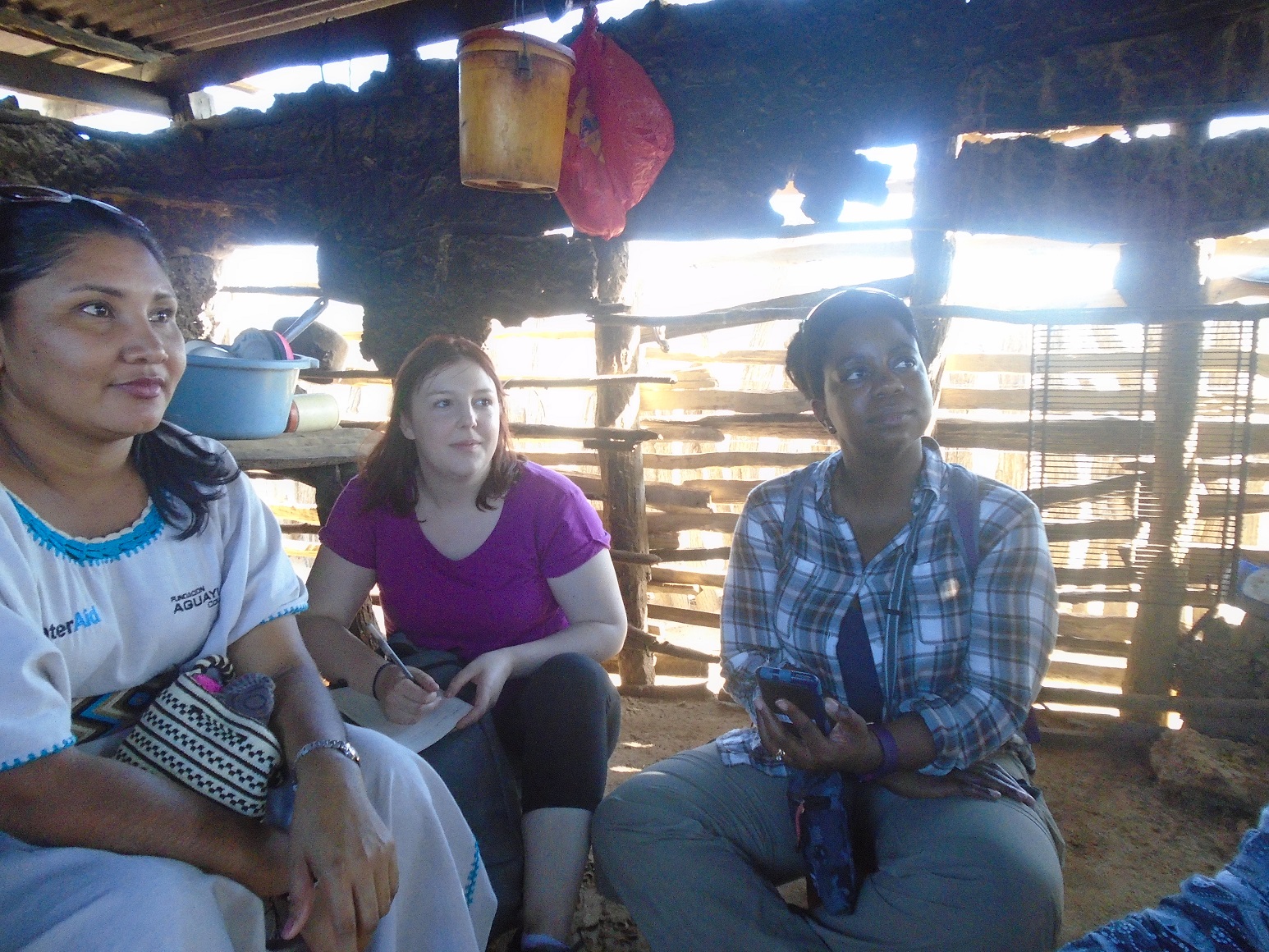Eric Niyonkoru

Families in the Rweru suffer from the most cases of waterborne infections in all of Bugesera due to the poor conditions of nearby rivers. Due to the significant distance between the other villages with cleaner water supplies, families are forced to rely on water boys. However, at times, the boys sell the water to nearby towns for more money or collect water for the local healthcare center — or in Eric Niyonkoru’s case, both. However, Niyonkoru, 20, was forced into this lifestyle because he had to provide for his family. “‘When I finished grade six of my education, my parents said ‘enough with the education,’” Niyonkoru said. “‘Now go out there and make us some money.’”
Curator’s note: The following is an excerpt of Eric Niyonkoru’s story as told by WaterAid staff on April 19, 2016.
“One night we were preparing to go to bed and my boy started vomiting and then he had this really bad diarrhea,” said Ayinkamiye Zebuliya. “He had a similar sickness when he was one and he survived it. So we convinced ourselves that we would take him to the health centre the next morning and went to bed. The vomiting continued in the morning but by this point, he was very weak. So we left for the health centre in the morning, but he didn’t make it. He died on the way. He was three.”
Then Zebuliya fell into a long silence.
As she held her head down looking at the floor, all I could see was the short, thick, Afro hair on her head. As a mother of six, she had seen it all. All her children had diarrhea and vomited one after the other. Where she lives, that’s just a normal part of a child’s growing up. This particular boy had diarrhea before too and he survived it. She thought this was just another one. There was no way she would have known this was going to be the one to steal her baby for good.
I sat on an old wooden chair across from her. She sat on a bench. Her house is small. There were probably one-and-half-metres of clayish dirt floor between us. But I could see, in her silence, that she’d gone far away from me. I gave her time. I thought her son wasn’t supposed to die like that at all. Not from such a preventable cause as diarrhea. Not in this day and age. Clean water was probably all that child needed from this world and it was not available to him.
Similar stories can be heard across Rweru sector, Bugesera district, Rwanda, where WaterAid and DFID are collaborating to bring water, sanitation and hygiene education in the next three years.
Zebuliya is pregnant again now seemingly to make up for the boy she lost. Replacing a lost child with a new one is quite a natural impulse for mothers — at least in the part of the world I come from. If that child were to be born in my country, Ethiopia, I thought, its name would be Mitikie, meaning ‘my compensation.’
“Where did you get your water from then?” I broke the silence when I thought she was ready.
“The swamp…by the lake,” she said. “The same as now.”
“I am going down there later. I will see it…”
I didn’t want to ask how clean it was.
She understood.
“The water is unclean,” Zebuliya said. “You find worms in it. People fish in it. They swim in it and bathe in it. They wash clothes in it. And animals pee in it. When you walk to the swamp, you see feces in the open. When it rains, the feces get washed into the swamp. When you boil the water, something creamy forms on the top. I have to boil it first, then take the creamy top off and sieve it into a bucket. Finally, I let it cool down and only then can I drink it or give it to my children. I feel sad to give to my children the water I know to be so polluted. But what choice do I have?”
According to Olivier Ndizeye, District Environment Health Officer with the Ministry of Health, Rweru Lake is the most polluted in the country. And because of that, Rweru sector reports the most cases of waterborne infections.
“Apart from malaria, the top six diseases in Rweru sector are caused by waterborne infections,” Ndizeye said. “It’s the biggest health challenge we have in Bugesera district. The best solution we found until we get a sustainable water supply is to harvest rainwater. But we have two dry seasons between May and September and December and March. We can’t depend on rainwater then. So communities have to go back to the lake for their daily water needs.”
The only choice women like Zebuilya have is walk up to four hours every day to another village and get water from the pump. For a mother that’s tasked with the farming, the cooking, the cleaning and clothes washing and still looking after the children, four hours is simply an impossible task.
“On bike, it takes a shorter time and I used to get the water on my bike,” Zebuilya said. “But when I am pregnant, I cannot go and collect it myself.”
Zebuliya is pregnant with her seventh child.
“So I have to pay the water boys up to 600 Rwandan Francs (RFs) for three jerry cans. But sometimes even if you are willing to pay, you can’t find the boys around as they would rather take the water to the nearby town and sell it for more money.”
I ran into one of those water boys. His name is Eric Niyonkoru. The 20-year-old slender young man has no business interest in collecting water for households like Zebuliya’s anymore as the health centre pays him more (and more regularly) as a full-time water collector.
“Yes, that’s where we get our water from, too,” said Ndamyuwera Edison, Head of the Nzangwa Health Centre. “In the rainy season, we harvest the water from the roof and use it. But in the summer, we have to go back to the lake. We have created a system now that helps us get some clean pump water for key purposes. But normally if we don’t have clean water, the mothers delivering here would have to bring it from their own homes.
If a mother asks for water during the summer, all that is available to her is unclean water from the lake. But as health experts, we are aware of the health risks such water poses both to the mother and to the baby. So we have now hired four young men whose main responsibility is fetching water every day. For the laboratory, for mothers and babies, they bring clean water from a water pump, which is about an hour and a half away on bike. For cleaning purposes, we fetch 20-30 jerry cans from the lake. It costs us a lot of money. Every month, between the salaries of the water collectors and bicycle maintenance, we spend an average of 231,800 RFs. That is a substantial amount for us, but if we are to put the welfare of the patients first, that is the only choice we have.”
That is approximately $3,500 USD a year, and for a health institution in such a small village, that makes up for a considerable chunk of their annual budget.
When a government health centre has to prioritize where to use its clean pump water, it is difficult to expect poor households such as Zebuliya’s to have better choices.
“The best I can do is boil it,” Zebuliya says. “You need fuel wood to do that. So if I have fuel wood, I boil it. If not, I will borrow water from my neighbours or just drink soda. I can’t drink it without boiling. For example, this past week has been like that. The water boys didn’t come, so the choice was to drink swamp water. I just borrowed some from my neighbours.”
Once every few days, when they are off-duty from their regular customers, water boys like Niyonkoru sell clean pump water for households such as Zebuliya’s to make some extra money.
“When I finished grade six of my education, my parents said ‘enough with the education. Now go out there and make us some money,’” Niyonkoru said.
The 20-year-old has five siblings. Some educated, others not. Education is a luxury for him; something set aside for those with parents who do not need their children’s support. He wakes up every morning and rides his bike for hours until he meets his daily quota for the hospital.
“Everyday, I collect eight to 10 jerry cans from the lake. That takes me up to 1 hour and 40 minutes. Then I ride to a village far away that has a water pump and bring up to four jerry cans of clean water. Including the waiting in line, it takes up to three hours. Others do the same. If we have collected enough water for the day — usually about 32 jerry cans from both sources — then we use the rest of our time doing gardening and cleaning the compound.”
Eric’s compromised future and schooling is not an isolated case. Albert Niygena is Nursery-Primary Education and Adult Literacy Officer at the District Education Office.
“Lack of water near villages results in school dropouts,” Niygena said. “Families will use their children (especially girls) to collect water but if the option of using their children to bring extra money into the family is available, they will use it. The prospect of making extra money is too luring for a poor household to withstand the temptation and help the children focus on their education.”
Niyonkoru then had to go to the lake. The janitors would need some water to clean the examination rooms, the maternity ward, and offices at the end of the day or early morning the next day. He put three jerry cans on the back of his old black bike, strapped them tight using car-tire rope and mounted his bike. He was wearing a magenta-red t-shirt, a khaki pair of trousers and a pair of slippers. He rode out onto the country road. He rode calmly and effortlessly as he was going down a hill, occasionally greeting other bikers coming his way from the other side.
Eric took several turns here and there — into the maize farms, out into the open, again, into the farms and finally down into the swamp.
Once he unstrapped the jerry cans from the bike, he took off his slippers, rolled up the legs of his trousers and slowly, as if feeling the texture of the mud with every step, walked into the swamp. He stopped at some point and inspected the quality of the water around him. He moved a little farther when he located a cleaner spot with fewer things floating on top of the water. Well, relatively. Then he slowly dipped his jerry cans, letting the water flow in. In a few minutes, the two jerry cans were filled and he filled the third.
“Do you ever worry about getting skin infections when you walk inside the swamp almost knee-high?” I asked.
“No. I don’t think about such things,” Niyonkoru said, looking up and smiling. “It’s my job and I just get on with it…”
His third jerry can was almost full. It was about 6:30 p.m. Soon, the sun would sink behind him and it would be scarily dark before he got to his village.
Eric strapped the jerry cans to the back of his bike and pushed it up until he got to the road. Then he rode off as fast as he could. Before he gets to the health centre, he has to pass by Zebuliya’s house. But he wouldn’t sell water to her.
WaterAid is collaborating with DFID to build on an existing borehole that is dug but not developed fully. There will be a pump pushing the water up into an existing government reservoir with a storage capacity of 75,000 litres. The reservoir is built at high altitude so that the water, once out of the reservoir, will use the natural force of gravity to reach over 10 existing, but non-operational community water points, a school and the Nzangwa Health Centre.
Built in 1999, Nzangwa Health Centre is the only health institution in the area with a maternity ward. That is why, with all its imperfections, pregnant women like Zebuliya still flock to it from the various villages around Nzangwa.
One of the ways in which WaterAid and DFID’s collaboration will help the health centre, other than providing a sustainable water supply, is by digging gender segregated toilets. At the moment, there is only one unisex toilet for over a hundred patients every day. The only toilet block is about 50 meters away from the main building where the maternity ward is.
“Walking that far can be difficult and risky for a pregnant woman having contractions,” said Ndamyuwera Edison, Head of the Nzangwa Health Centre. “If we had a reliable water supply, we could just open the existing toilet that is attached to the maternity ward and make their life easier.”
When WaterAid and DFID’s collaboration brings a consistent water supply to Nzangwa village, the health centre will be a really safe place where patients come to find a cure, not infections. As the project will also benefit several villages in the sector via at least ten community water distribution points, pregnant women like Zebuliya should not live in fear of losing their children.
“DFID and WaterAid have come where they are most needed,” said Oliver, an Environmental Health Officer. “If people are healthy, families will not have to abandon their farms and come to town looking for medical help. They will focus on their farms and improve their productivity. Children will not miss school days and drop out of their education. Our health system will go from treating avoidable waterborne infections to more preventive health education such as sexual reproductive health, family planning and so on. Our country’s economy will also benefit because we will not have to spend our foreign currency importing medicines for diseases we can prevent in the first place. The people know what this water project means to them. Trust me, once it’s there they will make sure it serves them for as long as it can. They will look after it.”
Photo credit: WaterAid/Behailu Shiferaw






